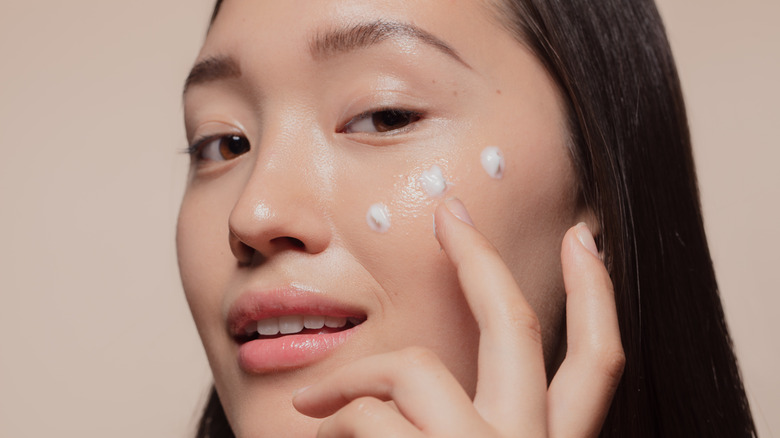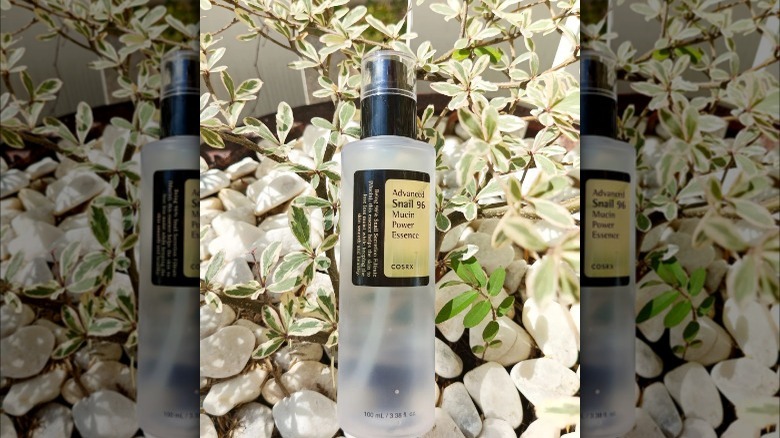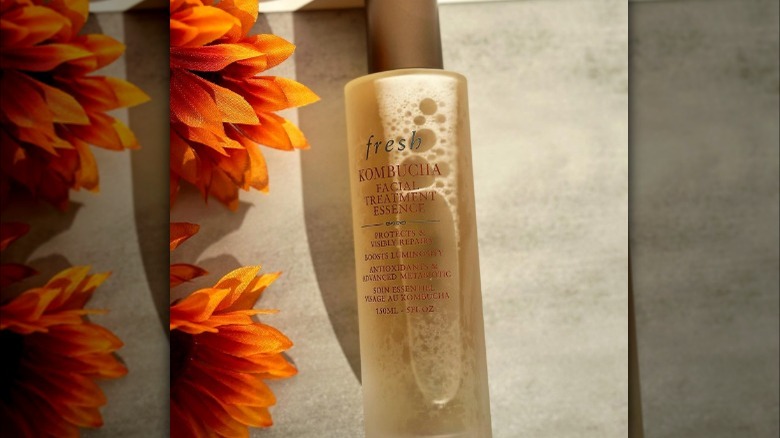The K-Beauty Ingredients That Will Make Your Skincare Routine Even Better
According to Shondaland, American consumers were first swept up by K-beauty back in 2011. In the years since, K-beauty has become more than a trend; it's a lifestyle. If you're unfamiliar with K-beauty, this umbrella term describes Korean skincare products, and it's known for promoting a 10-step skincare routine. This involves using an oil cleanser to remove makeup and following up with a water-based cleanser. Next, you'll exfoliate your skin and put on toner, an essence, and a serum. The last steps involve wearing a sheet mask, using eye cream, and moisturizing the skin. In addition, SPF in the morning is a must.
Alicia Yoon, the founder of the skincare brand Peach & Lily, told Shondaland why she thinks K-beauty has endured in the United States. She said, "Korean beauty is not about having perfect skin, no matter what that means; it's not about unrealistic skincare goals but about achieving your healthiest skin, and that's something aspirational for everybody." However, there are other reasons why K-beauty has continued to explode in the U.S. market. Korean skincare can work on all skin. Moreover, K-beauty is full of medicinal ingredients such as snail mucin and propolis that are uncommon in Western skincare products.
K-beauty ingredients that come from nature
In an article for MindBodyGreen, Alicia Yoon wrote that K-beauty has roots in agriculture. Thus, the ingredients used in K-beauty primarily originate from nature. Common examples include snail mucin, propolis, Centella asiatica, and more. At first, Americans were wary of some of these ingredients. However, they have become increasingly popular in the States, and with good reason. Snail mucin, for example, is made from snail secretions and is full of antioxidants. Dr. Kemi Fabusiwa noted to Refinery29 why snail mucin is beneficial. "This is a great barrier-protecting ingredient, but it also gives your skin a great shine," she said.
One snail mucin product that has gone viral is the Advanced Snail 96 Mucin Power Essence by COSRX. The product promises to hydrate the skin and help heal damaged skin, amongst other things. Like snail mucin, propolis, which comes from bee hives, is said to have antioxidants and provide glowing skin. It can also help irritated or inflamed skin. Centella asiatica is a plant with anti-inflammatory benefits and can aid with acne and other skin conditions.
Cosmetic chemist Esther Olu told Refinery29 what the most significant difference is between Western and K-Beauty ingredients. She said, "[Western skin care] is meant to help with anti-aging and things like redness, while Korean skin care focuses more on maintenance and skin barrier health."
Fermented skincare products are all the rage in K-beauty
While you might think that fermentation is only for food products, think again. Beyond using ingredients found in nature, K-beauty is all about fermented ingredients. Dermatologist Dr. Madhuri Agarwal explained to Vogue India what fermented skincare is and how it works. She said, "Fermented skincare is a process that employs microorganisms like yeast or bacteria to break down the skincare ingredients into smaller molecules or sizes so that they penetrate deeper (into the skin) and are absorbed better." In other words, you'll see increased results from using fermented ingredients or skincare products. They will also make your skin glow.
This is perfect if you're into K-beauty skin trends like glass skin or dumpling skin. Dermatologist Dr. Diane Madfes told The Klog why fermented ingredients are superior. She said, "One of the greatest benefits of fermented ingredients is that they help protect our skin from environmental aggressors by balancing our microbiome."
If you want to incorporate a fermented product into your skincare, try the Kombucha Antioxidant Facial Treatment Essence by Fresh. It has anti-aging properties and antioxidants, and it can combat the effects of pollution. On the fence about using fermented ingredients? Dermatologist Dendy E. Engelman told the Editorialist that anyone can use them but said, "People with sensitive skin, acne, rosacea, and hyperpigmentation can especially benefit from fermented ingredients."


